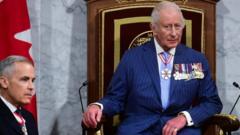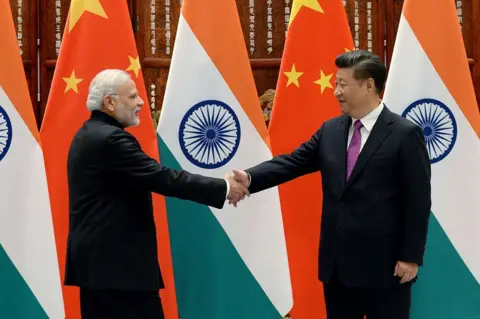Article Text:
In a significant address marking the opening of parliament in Canada, King Charles III delivered a throne speech that sought to articulate the nation’s position within a rapidly shifting global landscape and its evolving relationship with the United States. Speaking in Ottawa, the King outlined the priorities of Prime Minister Mark Carney, whose Liberal party emerged victorious in the recent general election that was heavily influenced by U.S. President Donald Trump's controversial comments on Canada's sovereignty.
The address, which was the first royal speech to open parliament in decades, called attention to the changing dynamics between Canada and its neighbors—a point underscored by the King’s subtle references to tensions with the U.S., despite not naming Trump directly. The speech began with a patriotic tone and highlighted the ongoing trade conflicts with the U.S., reminding Canadians of their shared "pleasure and pride" in their national identity. "Canada is a bold, ambitious, innovative country," King Charles stated, affirming the Crown's historical role as a unifying symbol.
Analysis of the speech revealed that the King's participation was a direct demonstration of support for Canada at a time of political uncertainty, particularly given Trump's recent suggestions for Canada to merge with the U.S. The King pointed to "unprecedented global challenges" and the necessity for Canada to reinforce trade relationships while also seizing opportunities for economic transformation.
The importance of domestic policy was also a central theme, as the King discussed upcoming infrastructure projects and the need to eliminate interprovincial trade barriers that cost the Canadian economy significantly each year. The Liberal government is expected to introduce legislation aimed at overhauling internal trade practices by July.
Moreover, the speech addressed critical issues, including the ongoing housing crisis plaguing Canada. King Charles highlighted plans to increase housing construction rates and proposed financial incentives for first-time homebuyers.
On security and defense, with mounting pressure from NATO allies, the King announced commitments to enhance military spending and cooperation with European partners. This includes potential participation in U.S. missile defense initiatives that have been controversial in the past.
Responses from various political figures to the throne speech indicated a polarized environment, with some opposition leaders questioning the specifics of the proposed plans, hinting at concerns over climate policy and social issues.
As Canada navigates through complex international relationships and domestic priorities, the King’s address served as a pivotal moment, reaffirming the nation's independence and commitment to facing forthcoming challenges head-on.
In a significant address marking the opening of parliament in Canada, King Charles III delivered a throne speech that sought to articulate the nation’s position within a rapidly shifting global landscape and its evolving relationship with the United States. Speaking in Ottawa, the King outlined the priorities of Prime Minister Mark Carney, whose Liberal party emerged victorious in the recent general election that was heavily influenced by U.S. President Donald Trump's controversial comments on Canada's sovereignty.
The address, which was the first royal speech to open parliament in decades, called attention to the changing dynamics between Canada and its neighbors—a point underscored by the King’s subtle references to tensions with the U.S., despite not naming Trump directly. The speech began with a patriotic tone and highlighted the ongoing trade conflicts with the U.S., reminding Canadians of their shared "pleasure and pride" in their national identity. "Canada is a bold, ambitious, innovative country," King Charles stated, affirming the Crown's historical role as a unifying symbol.
Analysis of the speech revealed that the King's participation was a direct demonstration of support for Canada at a time of political uncertainty, particularly given Trump's recent suggestions for Canada to merge with the U.S. The King pointed to "unprecedented global challenges" and the necessity for Canada to reinforce trade relationships while also seizing opportunities for economic transformation.
The importance of domestic policy was also a central theme, as the King discussed upcoming infrastructure projects and the need to eliminate interprovincial trade barriers that cost the Canadian economy significantly each year. The Liberal government is expected to introduce legislation aimed at overhauling internal trade practices by July.
Moreover, the speech addressed critical issues, including the ongoing housing crisis plaguing Canada. King Charles highlighted plans to increase housing construction rates and proposed financial incentives for first-time homebuyers.
On security and defense, with mounting pressure from NATO allies, the King announced commitments to enhance military spending and cooperation with European partners. This includes potential participation in U.S. missile defense initiatives that have been controversial in the past.
Responses from various political figures to the throne speech indicated a polarized environment, with some opposition leaders questioning the specifics of the proposed plans, hinting at concerns over climate policy and social issues.
As Canada navigates through complex international relationships and domestic priorities, the King’s address served as a pivotal moment, reaffirming the nation's independence and commitment to facing forthcoming challenges head-on.



















